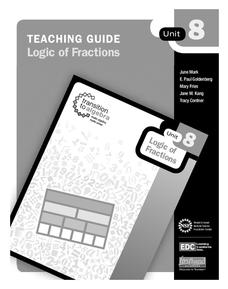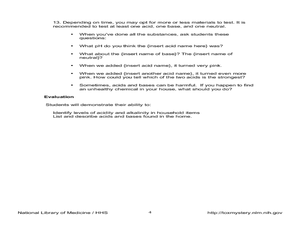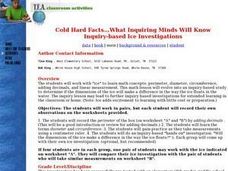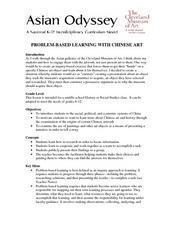Howard Hughes Medical Institute
Gorongosa: Making Observations Activity
Do you have young scientists wanting to make new discoveries rather than just completing the same experiments? Young scientists use their observational skills to identify animals and patterns in animal behavior. Through tracking...
ReadWriteThink
Literature Circles: Getting Started
Make reading more enjoyable and interactive with literature circles! Here you'll find detailed lessons to begin the literature circle process. Ten lessons introduce each role learners take on. Literature circle roles include...
Scholastic
What's Your Angle?
Identifying types of angles meets real-world application in an excellent, hands-on geometry activity. Learners use pipe cleaners and a visual model to independently discover the acute, right, or obtuse angles in their classroom, which...
Towson University
Mystery of the Crooked Cell
Can your class solve the Mystery of the Crooked Cell? Junior geneticists collaborate to learn about sickle cell anemia in a fascinating lesson plan. The included materials help them to examine the genetic factors behind the disease...
Curated OER
Scientific Methods and Inquiry Skills
Fifth graders conduct a mystery bag experiment and use the scientific method and inquiry skills to solve the mystery. They discuss how to make scientific "guesses," and in small groups use their five senses to try and figure out what...
Curated OER
Nonfiction Text: Comprehension Practice
A New York Times article about a 15-year-old style maven who in 2011 launched the fashion magazine "Rookie," based on her blog, makes high-interest nonfiction reading for secondary learners. This page asks 9 comprehension questions...
Curated OER
Ramps 2: Ramp Builder
Students design, build, and test their own ramps. They are introduced to a variety of materials and explore putting them together. Students engage in an inquiry-based learning experience to reinforce math, science, and technology...
Curated OER
Archaeological Inquiry
Students describe what they see as they observe an "artifact". They draw conclusions based on the information gathered to identify what the artifact might be used for and determine how old it might be.
Education Development Center
Logic of Fractions
Before diving into operations with fractions, learners discover the foundation of fractions and how they interact with one another. Exactly as the title says, logic of fractions is the main goal of a resource that shows pupils how...
Syracuse University
Civil War
What was it like to enlist as a soldier in the Civil War? By using enlistment papers, young scholars consider this question. After they've looked at the primary source and discussed it, they create a short story of a fictional soldier to...
Virginia Department of Education
Determining Direct Variation
Once learners realize what direct variation is, they see it's just a type of linear function. The lesson poses a general question that leads to the creation of the y = kx formula. The resource includes discussion prompts and ideas for...
Syracuse University
Harlem Renaissance
The music and literature of the Harlem Renaissance defined American culture, including its poetry. Using a poem from the period, individuals explore its musical qualities and how it is reflective of the period. Then, they use what they...
K20 LEARN
Periodic Shuffle: Introduction to Periodicity and Electron Configuration
No matter how you shuffle the elements, their electron configurations keep them in the same order. How can that be? Introduce the concept of periodicity through a lesson that combines inquiry, discussion, and comparison. Partners...
Curated OER
Acid or Base? Toxie's on the Case
Students recognize the difference between acids and bases. In this ToxMystery instructional activity, students play a computer game and experiment to find the difference between acids and bases. Students use litmus paper to determine if...
Curated OER
Inquiry into Infectious Disease: It's a Germy World After All
Young scholars choose a question from a given list and develop an investigation about it. In this biology instructional activity, students analyze bacterial growth by carrying out a guided experiment. They present their findings in class.
Curated OER
Greek Inquiry Report and Presentation
Sixth graders choose from a list of researchable inquiry questions. They engage in all phases of inquiry/research process.
Curated OER
Autumn
Take a walk through the forest as the leaves change color and fall from the trees, making way for a new ecosystem cycle to cycle through. An inquiry-based lesson plan examines how the process of decomposition eliminates tons of biomass...
Curated OER
A Novel Study Unit for The Cay
Novelly written questions are perfect for a novel study guide unit on The Cay. The well-rounded resource contains an anticipation guide for scholars to complete before reading, a variety of questions per chapter of the book, and a post...
Curated OER
Look At Those Leaves!
Students collect, measure and classify leaves. In this inquiry-based sorting and classifying lesson, students look at various types of leaves they have collected and measure them using a standard unit of measurement. Next, they relate...
Global Oneness Project
Exploring Cultural Sustainability
Small groups learn about a present-day nomadic culture in Mongolia and the threats to its existence by exploring a photo essay. The resource includes thoughtful discussion and writing prompts about cultural sustainability, the...
Curated OER
Cold Hard Facts? What Inquiring Minds Will Know -- Inquiry-Based Ice Investigations
Students are introduced to the concepts of perimter, diameter, circumference and measurements. In groups, they complete two worksheets in which they determine if the ice dimensions make a difference in the way it floats. They discuss...
Curated OER
Inquiry-based Investigations into Pond Water Microorganisms
Pupils become familiar with common microorganisms and experience exploring the microbial world.
Curated OER
Problem-Based Learning With Chinese Art
Students form small, cooperative learning groups, research a major Chinese dynasty and present their findings to the classroom in this multi-day instructional activity adaptable to many different age levels.
Curated OER
SAFETY KNOWLEDGE BASE CHANGES
Middle schoolers research and formulate a hypothesis for research to correlate changing safety regulations in regards to personal and environmental safety polices for storage, handling and disposal of chemicals, risk involved in...
Other popular searches
- Inquiry Based Learning Maths
- Inquiry Based Learning Plant
- Inquiry Based Learning Science
- Inquiry Based Learning Space
- Math Inquiry Based Learning

























